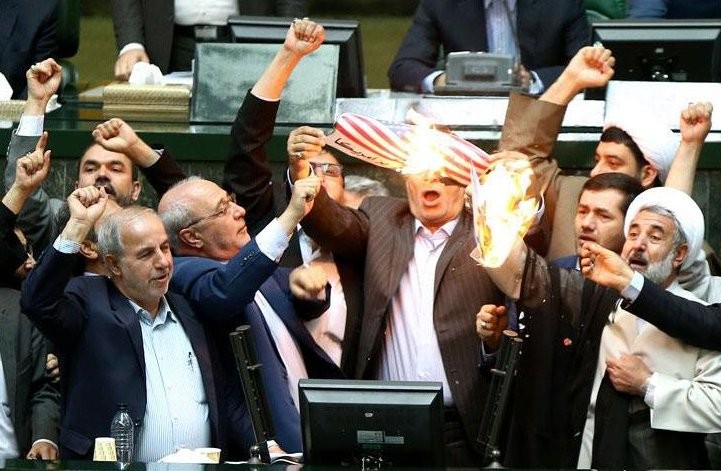Trump move fuels Mideast unrest
Iran scorns U.S. over nuclear deal pullout. Israel and Syria each report rocket fire.

With repercussions of the long-anticipated move by Trump rippling across the Middle East and elsewhere, Israel said its forces were in a high state of readiness against potential strikes by Iranian forces across the border in Syria. Shelters were opened in the Golan Heights and Israel deployed Iron Dome missile defense batteries.
In Tehran, shouts of “Death to America!” rang out in Iran’s parliament as some lawmakers set fire to a paper U.S. flag. Trump, in Washington, warned of “very severe” consequences if Iran resumes its nuclear program in response to the United States pulling out of the deal, which was signed by five other nations.
Khamenei, who has the final say in all affairs of state, used considerably harsher rhetoric than President Hassan Rouhani and Foreign Minister Mohammad Javad Zarif did a day earlier in criticizing Trump’s announcement.
“The body of this man Trump will turn to dust and his corpse will be fed on by snakes and insects, while the Islamic Republic continues to stand,” Khamenei said in remarks delivered to a group of schoolteachers and carried by state news outlets.
He accused Trump of telling repeated lies and engaging in “ugly and petty behavior.”
Iran’s defense minister, meanwhile, issued a warning that appeared aimed at least in part at Israel. Many analysts have suggested that the unraveling of the nuclear accord might embolden Israeli Prime Minister Benjamin Netanyahu to act in confronting Iran, which he has repeatedly described as the greatest threat to regional security.
“With attention to the defensive power of our country, we are in a position in which Islamic Iran cannot be militarily threatened by any foreign power,” the Iranian minister, Amir Hatami, said in comments carried by the official Islamic Republic News Agency.
Late Wednesday, Syria’s state news agency and activists reported rocket fire from Israel into southern Syria, the Associated Press reported.
Israeli officials, meanwhile, said about 20 projectiles were fired at Israeli positions by Iranian forces in Syria, with defense systems intercepting several of them. There were no Israeli casualties. Sirens sounded in the Golan Heights.
Earlier, Syria’s state news agency blamed a missile strike outside its capital, Damascus, on Israel, reporting that two projectiles were shot down at Kiswah, a military outpost. The agency
Israelis were rattled by the heightened state of alert. Over the course of the day, two senior Cabinet officials — Defense Minister Avigdor Lieberman and Education Minister Naftali Bennett — attempted to quell public fears, with each saying he did not believe the country was on the verge of war.
Netanyahu, meanwhile, flew to Moscow for consultations with Russian President Vladimir Putin about “continued coordination” between the Israeli and Russian militaries against the backdrop of Syria’s war.
In a statement, Netanyahu said he discussed with Putin “Israel’s obligation and right to defend itself against Iranian aggression from Syrian territory” in which Russia is the dominant military force.
Moscow is a signatory to the nuclear accord with Iran. Israel, Saudi Arabia and its Persian Gulf allies voiced approval of Trump’s pullout.
The potential disintegration of the Iran nuclear accord was expected to play out in proxy conflicts across the region.
In Riyadh, officials said missiles were fired overnight toward the Saudi capital by Iranian-backed Houthi rebels in Yemen but were intercepted.
European allies, dismayed by Trump’s decision, repeated determination Wednesday to try to salvage the accord. French President Emmanuel Macron conferred by phone with Rouhani, Iranian reports said.
But the U.S. pullout could prove a crippling blow to the pact, a signature foreign policy achievement of President Obama, Trump’s predecessor.
Even some U.S. allies in the Mideast expressed disapproval of Trump’s move. Iraq’s Foreign Ministry on Wednesday called the decision “hasty and rash.”
In his fiery speech, Khamenei accused Trump of telling at least 10 lies in a bellicose address from the White House a day earlier.
Before the supreme leader spoke, the same lawmakers who torched and waved aloft a paper U.S. flag also burned a document representing the nuclear deal and ground the scorched remains underfoot.
Such symbolic public expressions of disdain for the United States are common in Iran but unusual inside the parliament building.
Late Tuesday, after Trump’s remarks, Rouhani said Zarif would be speaking with envoys from the deal’s remaining signatories: France, Germany, Britain, Russia and China. But he also said that if efforts to save the accord were unsuccessful, Iran would resume “industrial-scale” uranium enrichment.
Britain’s foreign secretary, Boris Johnson, on Wednesday challenged Trump to detail any plans to replace the nuclear deal. No such proposals have been unveiled in Washington.
Ali Larijani, Iran’s parliament speaker, echoed Rouhani’s warning that there was a narrow window for reaching terms to keep the accord in place.
“The period is only a window in which the [European Union] can prove if it has enough weight for settling international issues,” he said.
Iran’s economy is already staggering along, and many ordinary citizens worried that Trump’s decision to reimpose harsh sanctions — and try to force other trading partners to do the same — could do devastating harm.


